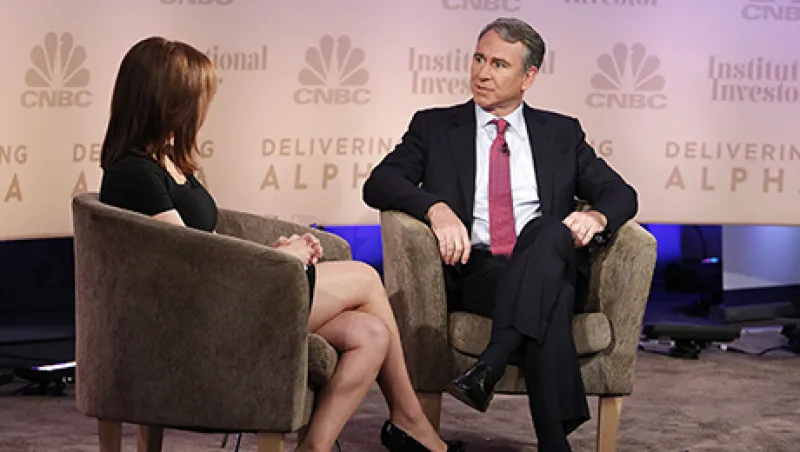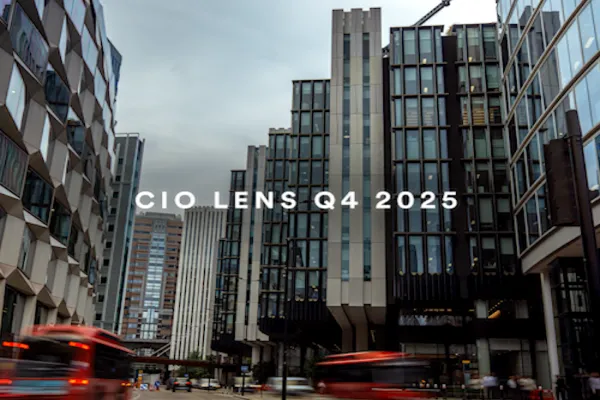Citadel founder and CEO Ken Griffin has long been relatively press-shy. But he has begun to open up over the past few years and at the 4th annual Delivering Alpha conference in New York Wednesday he offered a number of opinions, both candid and guarded, on high-frequency trading, reports that Rupert Murdoch had made an $80 billion offer for Time Warner and on the Federal Reserve and Illinois politics.
Griffin, interviewed by CNBC’s Kate Kelly, was upbeat about Murdoch’s 21st Century Fox’s reported bid for Time Warner. “Great deal,” he said. “Great companies. Makes a lot of sense.”
While the media giant has reportedly rebuffed Murdoch, Griffin, who has stakes through Citadel in both companies, argued that a deal will likely occur if Murdoch perseveres because Time Warner has no controlling shareholder. That’s not a situation in a number of other major media companies, including of course 21st Century Fox, which may shape further media consolidation in a hot M&A market. As a result, he said, a deal for Time Warner would come down to what shareholders want, presumably on price. Murdoch, he notes, has done a particularly good job of positioning his companies for a global media world.
Griffin recently testified before Congress on high-frequency trading, an issue stirred up recently by Michael Lewis’ bestseller “Flash Boys.” Griffin defended Citadel, which is a major broker (and appears in the book), for its performance and service to investors, including retail brokers. He was, however, relatively guarded over larger issues of fairness raised by HFT trading, repeatedly noting only that “Flash Boys” was “a story.”
He was more concrete about a changing Wall Street. “We’re definitely seeing a transformation of banking,” he said. Banks are stepping back from a number of trading activities, opening up areas like interest-rate swaps to new entrants. Trading was long a “glamorous” business for the banks, but 2008 exposed its deficiencies. What was the return to shareholders of some of these trading business? “They were abysmal, except for a few top firms,” he said.
Citadel itself struggled through the financial crisis, taking huge losses and almost going under in 2008. Griffin noted that the hedge fund firm survived only by working to understand “where the future lies.” The result: the firm reoriented itself around the most liquid assets. “By keeping the core team together we were able to move forward.”
Griffin was relatively upbeat about the Federal Reserve as it tries to end its quantitative easing program and raise interest rates without causing havoc. It’s very difficult to halt a cycle in midstream, he noted. And the Fed is clearly apprehensive about moving too soon and halting the recovery. Griffin believes that while the Fed will take its time before it moves, when it does it will move aggressively to raise rates, hoping that the recovery has enough momentum to absorb the shock.
Citadel, he notes, doesn’t take a macro position when it comes to stocks. Instead, the firm tries to understand in a granular fashion the businesses it invests in.
Politically, Griffin dropped some subtle hints – and some not-so subtle suggestions. The hedge fund manager was most critical of Illinois and Chicago, where Citadel is based, for its failure to tackle a number of chronic problems, including an underfunded state pension fund, a struggling educational system and a talent drain. Griffin recently donated $2.5 million to Bruce Rauner, a Republican candidate for governor, the single-biggest political contribution in Illinois after Watergate.
Griffin noted that too many politicians of both parties were lifelong officeholders who were captive of extreme local interests. “The differences between Republicans and Democrats is actually quite thin,” he said, which reflected the views of most Americans.
Asked by Kelly whether he would ever think of running for governor, Griffin answered with a smile, “I can’t see it in my future now.”






